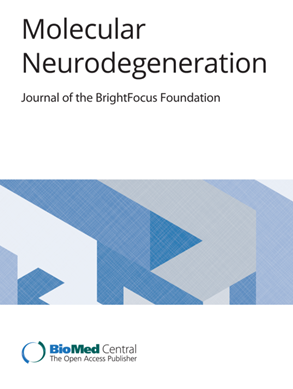帕金森病的免疫细胞代谢功能障碍
IF 14.9
1区 医学
Q1 NEUROSCIENCES
引用次数: 0
摘要
帕金森病(Parkinson's disease,PD)是一种多系统疾病,从组织病理学角度看,其特征是黑质髓质中的多巴胺能神经元变性。虽然帕金森病的病因仍然是多因素和复杂的,但越来越多的证据表明,细胞代谢功能障碍是神经元死亡的关键驱动因素。据报道,在帕金森病的神经元和免疫细胞中,与能量产生、氧化应激、代谢细胞器健康和蛋白质平衡有关的细胞代谢缺陷都存在。我们认为,这些因素在免疫细胞中协同作用,推动了帕金森病中枢神经系统和外周的异常炎症,形成了一种不利的炎症环境,使某些神经元亚群容易发生变性。本综述强调了帕金森病神经元代谢缺陷与中枢和外周免疫细胞新发现之间的重叠。通过讨论有关帕金森病免疫代谢功能障碍的迅速扩展的文献,我们旨在提请人们注意潜在的生物标志物,并促进未来免疫调节策略的发展,以预防或延缓帕金森病的进展。本文章由计算机程序翻译,如有差异,请以英文原文为准。
Immune cell metabolic dysfunction in Parkinson’s disease
Parkinson’s disease (PD) is a multi-system disorder characterized histopathologically by degeneration of dopaminergic neurons in the substantia nigra pars compacta. While the etiology of PD remains multifactorial and complex, growing evidence suggests that cellular metabolic dysfunction is a critical driver of neuronal death. Defects in cellular metabolism related to energy production, oxidative stress, metabolic organelle health, and protein homeostasis have been reported in both neurons and immune cells in PD. We propose that these factors act synergistically in immune cells to drive aberrant inflammation in both the CNS and the periphery in PD, contributing to a hostile inflammatory environment which renders certain subsets of neurons vulnerable to degeneration. This review highlights the overlap between established neuronal metabolic deficits in PD with emerging findings in central and peripheral immune cells. By discussing the rapidly expanding literature on immunometabolic dysfunction in PD, we aim to draw attention to potential biomarkers and facilitate future development of immunomodulatory strategies to prevent or delay the progression of PD.
求助全文
通过发布文献求助,成功后即可免费获取论文全文。
去求助
来源期刊

Molecular Neurodegeneration
医学-神经科学
CiteScore
23.00
自引率
4.60%
发文量
78
审稿时长
6-12 weeks
期刊介绍:
Molecular Neurodegeneration, an open-access, peer-reviewed journal, comprehensively covers neurodegeneration research at the molecular and cellular levels.
Neurodegenerative diseases, such as Alzheimer's, Parkinson's, Huntington's, and prion diseases, fall under its purview. These disorders, often linked to advanced aging and characterized by varying degrees of dementia, pose a significant public health concern with the growing aging population. Recent strides in understanding the molecular and cellular mechanisms of these neurodegenerative disorders offer valuable insights into their pathogenesis.
 求助内容:
求助内容: 应助结果提醒方式:
应助结果提醒方式:


